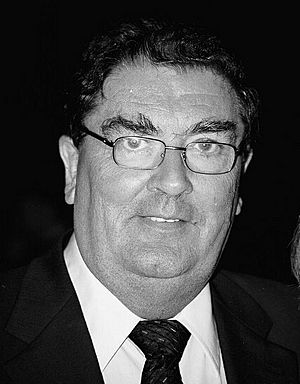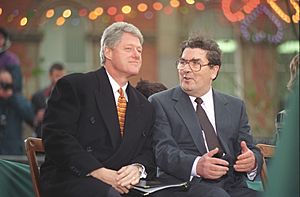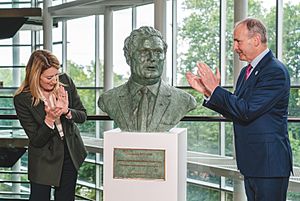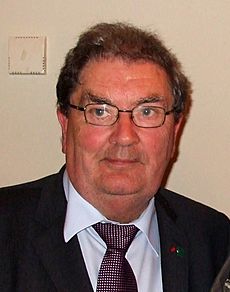John Hume facts for kids
Quick facts for kids
John Hume
KCSG
|
|
|---|---|

Hume in 1998
|
|
| Leader of the Social Democratic and Labour Party | |
| In office 6 May 1979 – 6 November 2001 |
|
| Deputy | Seamus Mallon |
| Preceded by | Gerry Fitt |
| Succeeded by | Mark Durkan |
| Member of the Legislative Assembly for Foyle |
|
| In office 25 June 1998 – 1 December 2000 |
|
| Preceded by | Constituency established |
| Succeeded by | Annie Courtney |
| Member of Parliament for Foyle |
|
| In office 9 June 1983 – 11 April 2005 |
|
| Preceded by | Constituency established |
| Succeeded by | Mark Durkan |
| Member of the European Parliament for Northern Ireland |
|
| In office 10 June 1979 – 13 June 2004 |
|
| Preceded by | Constituency established |
| Succeeded by | Bairbre de Brún |
| Member of the Parliament of Northern Ireland for Foyle |
|
| In office 24 February 1969 – 30 March 1972 |
|
| Preceded by | Eddie McAteer |
| Succeeded by | Parliament abolished |
| Personal details | |
| Born | 18 January 1937 Derry, Northern Ireland |
| Died | 3 August 2020 (aged 83) Derry, Northern Ireland |
| Nationality | Irish |
| Political party | Social Democratic and Labour Party |
| Spouse |
Patricia Hone
(m. 1960) |
| Children | 5 |
| Alma mater | St Patrick's College, Maynooth |
| Profession | Educator |
John Hume (born 18 January 1937, died 3 August 2020) was a very important politician from Northern Ireland. He is known as one of the main people who helped bring peace to Northern Ireland. This is often called the Northern Ireland peace process.
John Hume was born in Derry. He helped start the Social Democratic and Labour Party (SDLP). He was the leader of this party from 1979 to 2001. He also served as a Member of the European Parliament (MEP). He was a Member of the UK Parliament (MP) and a member of the Northern Ireland Assembly (MLA).
In 1998, John Hume won the Nobel Peace Prize along with David Trimble. He also received the Gandhi Peace Prize and the Martin Luther King Award. He is the only person to have won all three of these major peace awards.
In 2012, Pope Benedict XVI made Hume a Knight Commander of the Papal Order of St. Gregory the Great. In 2010, a public vote by RTÉ named him "Ireland's Greatest" person in Irish history.
Contents
Early Life and Education
John Hume was born in 1937 in Derry. He grew up in a working-class Catholic family. He was the oldest of seven children. His mother, Anne, was a seamstress, and his father, Samuel, worked in a shipyard.
John went to St Columb's College. Then he studied at St Patrick's College, Maynooth. This was a main Catholic college in Ireland. He first planned to become a priest.
He did not finish his studies to become a priest. But he earned a master's degree in French and history in 1958. After that, he went back to Derry. He became a teacher at his old school, St Columb's College.
Helping Communities with Credit Unions
John Hume helped start the Credit Union movement in Derry. Credit unions are like banks owned by their members. They help people save money and get loans.
He became the youngest ever President of the Irish League of Credit Unions at age 27. He held this role from 1964 to 1968. He once said that helping the credit union movement was what he was most proud of. He believed it did a lot of good for people in both Northern and Southern Ireland.
Fighting for Civil Rights
In the late 1960s, John Hume became a key figure in the civil rights movement. He was part of the Derry Citizens' Action Committee (DCAC). This group was formed after a march in Derry in 1968.
The DCAC wanted to show the problems in Derry that had been ignored for years. They focused on local issues and wanted to keep protests peaceful. They even had stewards to prevent violence at marches.
Political Career and Peace Efforts

John Hume started his political career in 1969. He became an independent member of the Parliament of Northern Ireland. This was during the height of the civil rights campaign.
He was elected to the Northern Ireland Assembly in 1973. He served as Minister of Commerce in the power-sharing government in 1974. This government did not last long.
He became a Member of the UK Parliament for Foyle in 1983. He also served as one of Northern Ireland's three Members of the European Parliament.
Working for Peace Agreements
John Hume was a founding member of the Social Democratic and Labour Party (SDLP). He became its leader in 1979. He was deeply involved in secret talks with the British government and Sinn Féin. He wanted to bring all groups to the discussion table.
These talks are believed to have led to the Anglo-Irish Agreement in 1985. This agreement gave the Irish government a say in Northern Ireland affairs. Many unionists and some republicans did not like this agreement.
However, Hume kept talking with both governments and Sinn Féin. His efforts with Gerry Adams led to the 1994 IRA ceasefire. This ceasefire helped create a more peaceful time. It eventually led to the Good Friday Agreement in 1998. This agreement was a major step towards peace in Northern Ireland.
Reputation and Legacy
John Hume is seen as the person behind many important political changes in Northern Ireland. These include the power-sharing Sunningdale Agreement, the Anglo-Irish Agreement, and the Belfast Agreement.
He won the Nobel Peace Prize in 1998 with David Trimble. Trimble was the leader of the Ulster Unionist Party. When Trimble became First Minister, many thought Hume would be Deputy First Minister. But Seamus Mallon from Hume's party took that role instead.
When Hume retired from leading the SDLP in 2001, he received praise from all sides. Even his long-time political opponent, Rev. Ian Paisley, spoke highly of him. John Hume held a special teaching position at the University of Ulster focused on peace studies.
Retirement and Later Life
On 4 February 2004, John Hume announced he was fully retiring from politics. Mark Durkan took over as the SDLP leader. Hume did not run in the 2004 European election or the 2005 general election.
John and his wife, Pat, continued to work for European unity. They also supported efforts against global poverty and the Credit Union movement. He was a supporter of a group that wanted a United Nations Parliament.
Even in retirement, he gave public speeches. A building at the National University of Ireland, Maynooth was named after him. He was also the Club President of his local football team, Derry City F.C.. He supported them his whole life.
Personal Life
In 1960, John Hume married Patricia "Pat" Hone. She was a primary school teacher. They had five children: Thérèse, Áine, Aidan, John, and Mo. They also had 16 grandchildren and two great-grandchildren. Pat Hume passed away in 2021.
Death

In 2015, John Hume was diagnosed with Alzheimer's disease. He had shown signs of it since the late 1990s. He died on 3 August 2020, in a nursing home in Derry, at age 83.
Many important people shared their sadness and respect after his death. Former UK Prime Minister Tony Blair called him "a political titan; a visionary." The Dalai Lama said Hume's strong belief in talking and negotiating to solve problems was inspiring. He said Hume's leadership helped achieve the 1998 Good Friday Agreement.
Awards and Honours
- LL.D. (honorary degree), Boston College, 1995 (one of 44 honorary doctorates Hume received)
- LL.D. (honorary degree), University College Galway, 1996
- Four Freedoms, Freedom of Speech Medal Recipient, 1996
- Golden Doves for Peace Journalistic Prize, 1997
- Nobel Prize for Peace (co-recipient), 1998
- Officier de Légion d’Honneur, France, 1999
- Martin Luther King Award, 1999
- Blessed are the Peacemakers Award from Catholic Theological Union, 2000
- International Gandhi Peace Prize, 2001
- Golden Plate Award of the American Academy of Achievement, 2002
- Freedom of two cities; Derry City in 2000 & Cork in 2004
- Honorary D.Litt., St. Thomas University, Fredericton, N.B., 2007
- Honorary Patron, University Philosophical Society, Trinity College Dublin, 2007
- Ireland's Greatest (public poll conducted by RTÉ), 2010
- Knight of Saint Gregory, 2012
See also
 In Spanish: John Hume para niños
In Spanish: John Hume para niños
- List of peace activists
Quotes
- "Over the years, the barriers of the past—the distrust and prejudices of the past—will be eroded, and a new society will evolve, a new Ireland based on agreement and respect for difference."
- "I thought that I had a duty to help those that weren't as lucky as me."
 | Bayard Rustin |
 | Jeannette Carter |
 | Jeremiah A. Brown |


